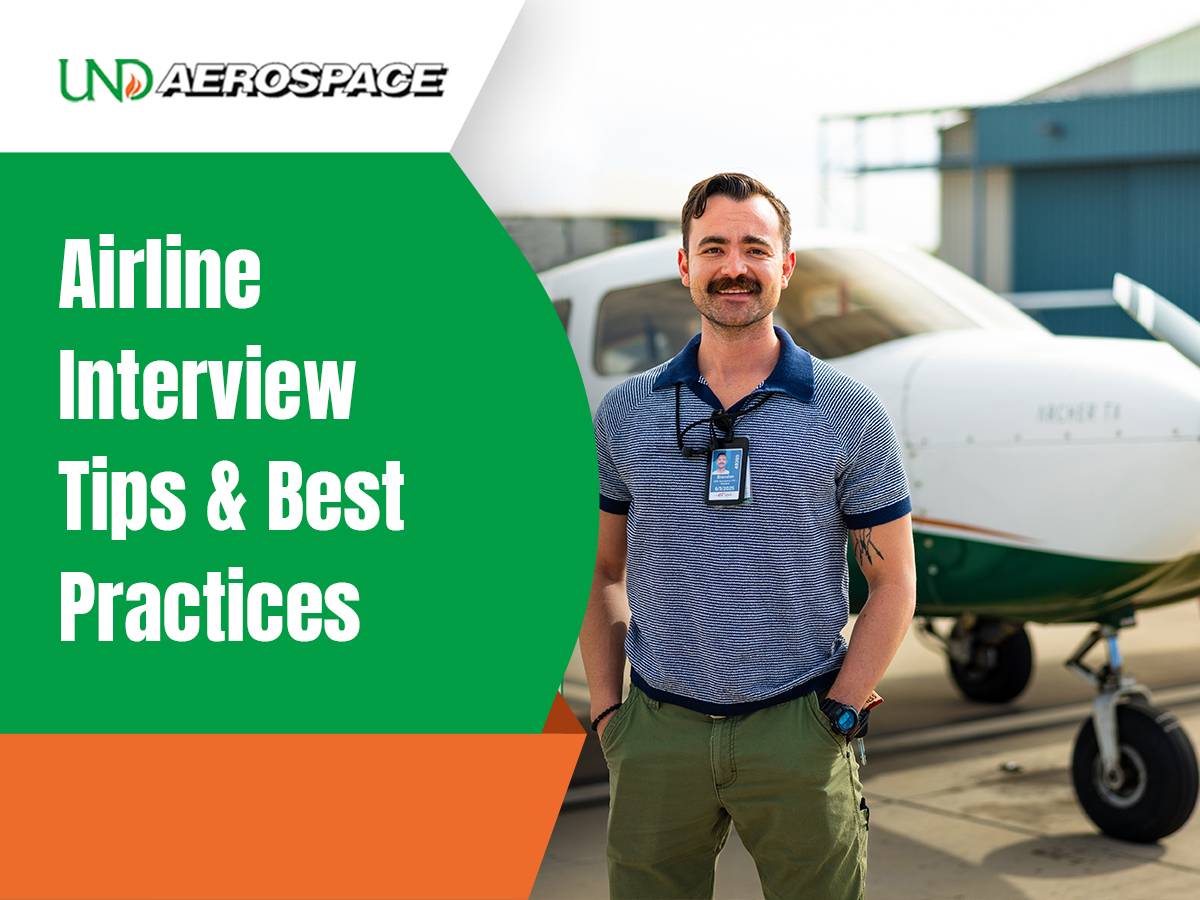Essential airline interview tips for pilots - prepare with confidence.
Airline interviews represent a crucial milestone on the journey to becoming a commercial pilot in Phoenix. After dedicating months to rigorous training and accumulating flight experience, this is your opportunity to showcase your readiness for the cockpit.
Success in the aviation world goes beyond merely logging flight hours; it hinges on your confidence, preparedness, and professionalism. The interview is where your technical expertise.
converges with your communication skills, allowing you to demonstrate that you are not just qualified but truly ready for this significant responsibility.
At UND Aerospace Phoenix flight school, we ensure our student pilots are prepared to pass the license-granting exams and thrive in the challenging aviation world. That includes helping them develop the mindset, professionalism, and leadership skills that airlines are looking for when interviewing. Whether you're getting ready for your first airline job interview or want to sharpen your approach, this guide walks you through proven tips and best practices that can make a real difference.
1: Dress Like a Professional Pilot
The airline industry demands a high level of professionalism, and this expectation begins as soon as you enter the interview room.
Dress in business formal attire: A suit and tie for men, or a coordinated skirt/pants and blazer for women, is standard. Think of this as your first impression—your presentation should reflect the level of responsibility the job carries. Your grooming, posture, and body language should all exude confidence and composure. Remember to be punctual, courteous, well-prepared, and organized.
2. Your Logbook Says a Lot About You
Your logbook should be clean, accurate, and easy to navigate. Use well-organized tabs to showcase key milestones like checkrides, endorsements, and PIC time. A neat, well-prepared logbook shows more than flight time—it signals attention to detail and respect for the profession.
3. Answering: “Tell Us About Yourself”
This is almost always how interviews begin. It’s your chance to take control of the conversation and set the tone. Take three to five minutes to introduce yourself and walk the interviewers through your background.
Talk about your path into aviation, your strengths, your motivations, and your career goals. Don’t just list off resume points—connect the dots. Highlight the experiences that have shaped you, and be authentic about what truly drives you. It's also a chance to showcase your strong communication skills.
4. Handling Behavioral HR Questions
Airlines want to know how you respond to challenges, not just in the cockpit but in everyday crew and passenger interactions.
You can expect questions like:
- “Tell me about a time when…,” or
- “Describe how you would handle...”
In such a scenario, go for real-life examples when answering. These don’t have to be aviation-related, but should reflect your character, ability to work under pressure, and problem-solving capabilities. Take a few minutes to tell your story clearly and concisely. If there's a pause afterward, don't feel the need to keep talking. Silence usually means the interviewer is taking notes.
5. Aceing the Technical Portion
The technical section often focuses on your highest certificate or rating. For many candidates, that means planning and explaining an IFR flight.
Avoid relying on pre-made flight plans. Instead, prepare a custom plan that you can explain clearly. Bring a digital copy of your flight plan and a physical copy as backup.
Make sure you understand and can clearly explain:
- Weather interpretation
- NOTAMs
- Fuel planning
- Alternate selection
- Instrument procedures
Also, study the FAA Airman Certification Standards (ACS) to become aligned with what examiners and interviewers expect. Know your Stabilized Approach criteria by heart—many interviewers will use this as a litmus test for your job readiness.
6. “Why This Airline?”
This closing question is your chance to stand out. Instead of generic responses about things like growth opportunities or aircraft fleet size, clearly explain what draws you to the airline you’re interviewing for: describe how the company culture, core values, and other factors align with your personal values and professional goals.
You might also want to highlight their reputation, safety credentials, and their commitment to mentorship and career advancement. Show that you've done your research and you're genuinely excited about the opportunity.
Preparing for Interviews Starts in the Right Flight Training Environment
Airline interviews test more than flight skills. They measure maturity, communication skills, professionalism, critical thinking, and decision-making. That’s why it’s important to train at a flight school that prepares you for all aspects of the job—not just the final checkride test.
At UND Aerospace Phoenix, we offer a rigorous curriculum designed to help our students pass their certification-granting examinations and be well-prepared to succeed in the real world. We don’t just train you to pass your exam—our instructors guide you with insights from years in the field, covering everything from flight operations, safety procedures, critical thinking, and so much more.
Our Phoenix flight school ensures that by the time you walk into that interview room, you will be equipped not only with the technical skills required for flying but also with the confidence, professionalism, and communication skills necessary to excel in interviews and stand out as a top candidate.
Ready to Join a Top Mesa Flight School?
An airline interview can feel intimidating, but proper preparation will turn nerves into confidence. When you show up polished, professional, and well-practiced, you stand out for all the right reasons.
The journey to an airline flight deck starts with choosing the best Arizona flight school. If you're looking to build the skills, habits, and mindset that airlines look for when hiring a pilot, UND Aerospace Phoenix is ready to help you make your dream a reality.
Contact us today to learn more or book a Discovery Flight to see what our Mesa flight school is all about!

